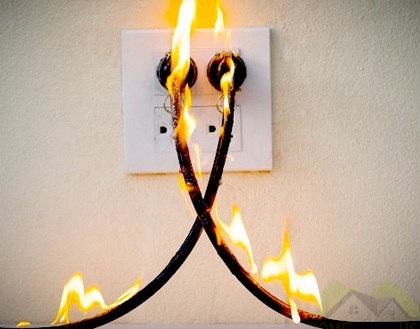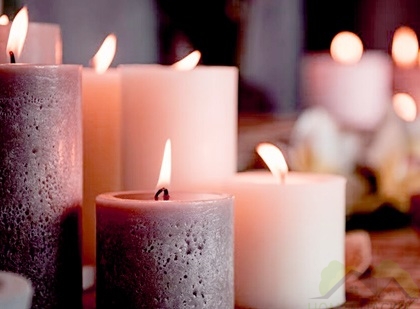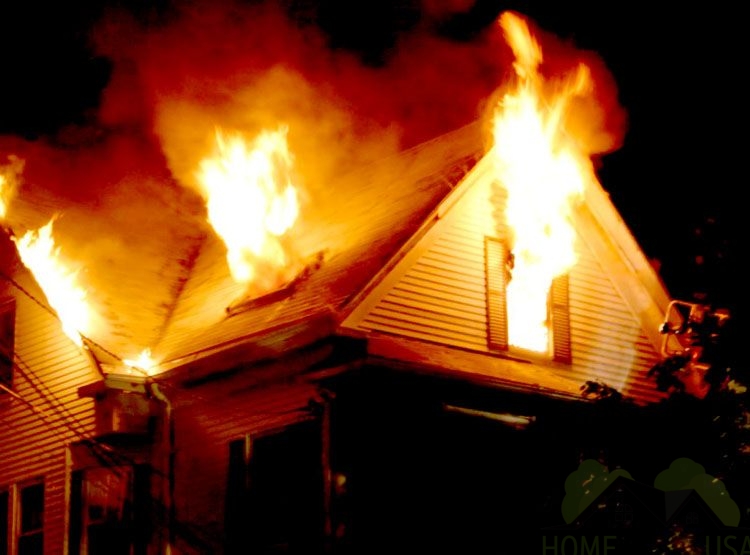Unfortunately, house fires do happen and often they come surprisingly and spread in seconds, leading to devastating consequences. They are definitely not a joke and everyone should be informed about the risks of ignition in their homes, in order to be able to take the necessary measures.
We, at HomeShackUSA.com think that it’s good to have a home insurance, but still there are many other things you can do, so that you minimize the chance of such an incident happening. If you are taking these precautions, you should feel much safer and your time spent at home could be a lot more relaxing, than if you had to constantly worry.
What Causes Fire in Homes Most Often
There are 7 major factors that cause the majority of fires in homes. Knowing them and taking precautions is paramount if you want to guarantee the maximum level of safety for your home.
Here are the causes with explanations and tips on how to protect your home from the potential danger.
1. Unattended Cooking
The factors that could cause a fire during cooking are numerous. That is why you should take the necessary precautions and never leave the stove unattended.
Before putting electrical appliances that heat up during cooking, make sure they’ve completely cooled off. If you love to barbecue in your yard, don’t use the grill near wooden fences and patios.
2. Heating Home Appliances
Heaters are usually equipped with safety systems and technologies that serve to prevent fires, but still, they are not completely safe. If fabrics are left near these appliances, they might become the reason for combustion.
Never leave heating appliances working while you’re not at home. If you have any heaters that require fuel in order to work, better replace them with modern and safe solutions.
3. Electricity
 Electrical fires are truly horrible and devastating, because they can’t be put down using water.
Electrical fires are truly horrible and devastating, because they can’t be put down using water.
They often start at places where they cannot be seen and quickly spread around the whole building.
These types of fires could happen due to electrical faults, such as short circuits, or circuits that are overloaded.
Electricity is generally not something to play with, but if you want to make completely sure that the chance of an electrical fire is minimal, here is what to consider:
- Have a professional electrician inspect your home annually;
- Unplug electrical items and appliances while not using them;
- Choose bulbs with the recommended watts;
- Check often cords and appliances for damage.
4. Candles
 Candles cause a significantly large percentage of fires in homes. Even though they come with a warning not to be left unattended, not everyone keeps that.
Candles cause a significantly large percentage of fires in homes. Even though they come with a warning not to be left unattended, not everyone keeps that.
Don’t leave candles burning while you are sleeping, and if you have children, never place the candle in a place where they could reach it. Most fires caused by candles happen during the winter holidays, so be especially careful around that time.
Nowadays there are numerous lighting options besides candles, so it’s better to stick to a safer option if you want to minimize the chances of igniting a fire.
5. Cigarettes
Yep, cigarettes are dangerous and smoking kills. We’ve covered that a lot of times, but now we’re looking at a different aspect of how they are dangerous.
Sometimes the cause of a fire at home is falling asleep while smoking on your couch. Another way smoking starts a fire is when people dump the remains in the ashtray into the trash bin while there are still burning ashes that they haven’t noticed.
6. Holiday Decoration
Holiday decoration creates a marvelous atmosphere and lights up the mood, but we have to be careful with it, because things could get too lit up.
A single spark from the fireplace could be fatal when evergreen trees are left to dry out. Be careful when choosing your Christmas lights too. Nowadays they are mostly LED lights, which are safe, because they don’t get hot, so it’s best to stick to them.
7. Chemicals
Unfortunately, chemical fires happen in homes too, although they are more typical in industrial environments. They could happen during cooking when fumes from the gasoline reach a certain temperature and go up into flames.
Sometimes spontaneous combustion also happens in homes. That is the process when a chemical reacts with the oxygen in the atmosphere and produces fire.
These types of fires are rare in homes, but because they happen in surprising ways, they are often fatal.
Here is how to avoid them:
- Store chemicals in proper containers;
- Make sure containers are sealed tightly;
- Don’t fill containers up to more than 95%;
- Don’t store them next to appliances and lights.
If you take all these necessary precautions, you will significantly lower the chances of a fire at home. If, however, it happens, immediately call professional help and don’t try to handle the situation only by yourself.





